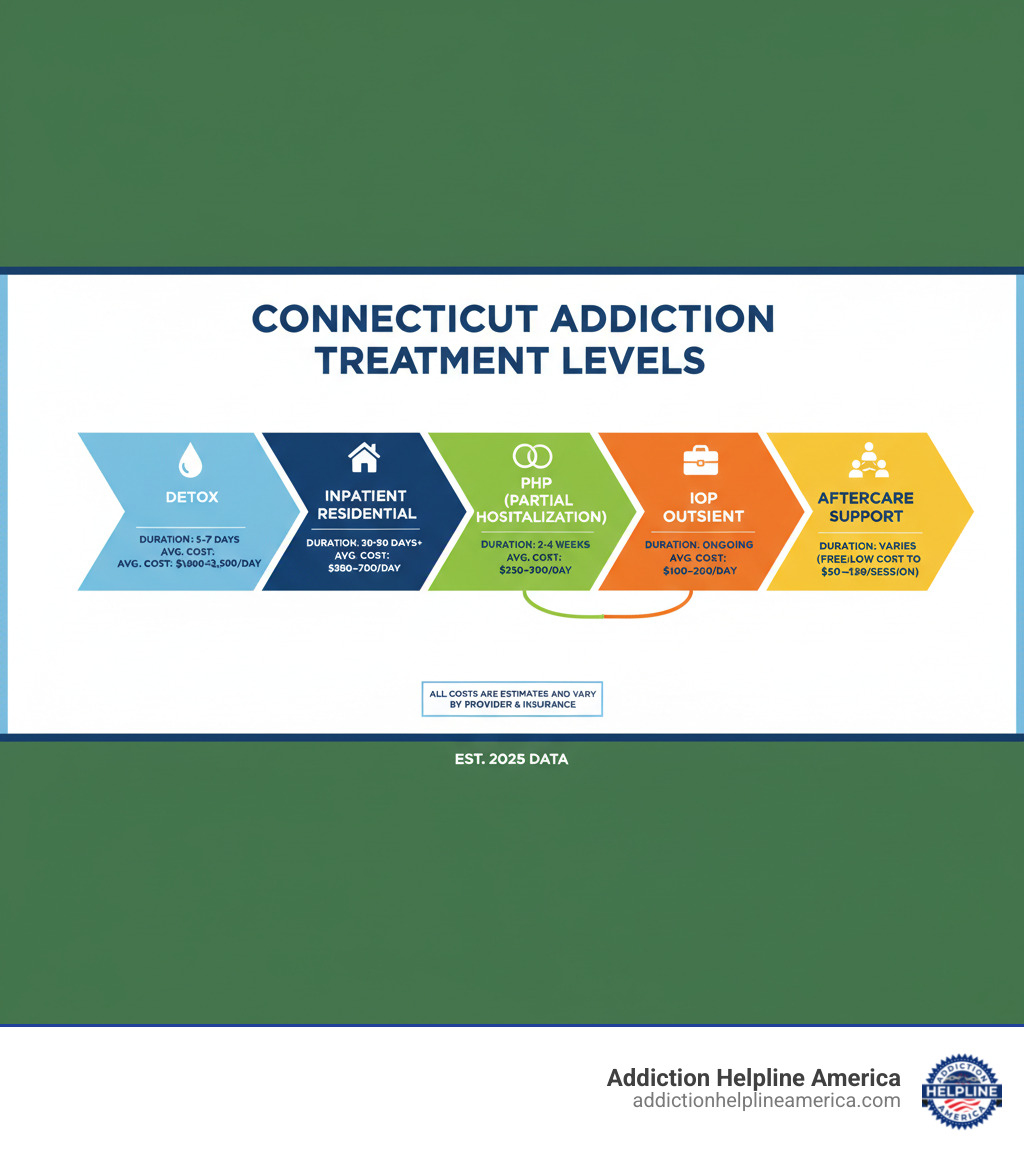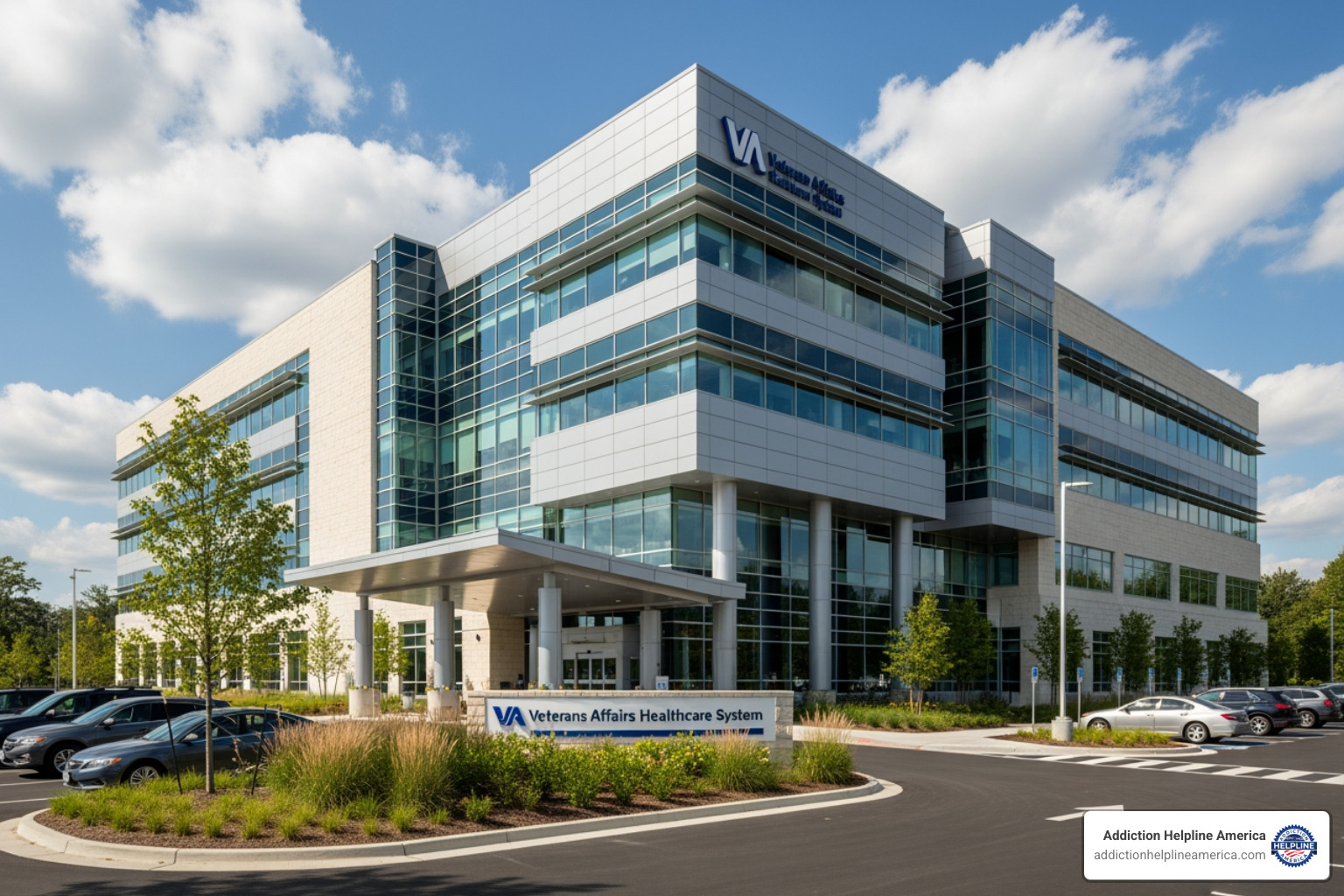
Why Finding the Right Rehab Center Matters for Your Recovery
Rehab centers Connecticut offer a lifeline for individuals and families facing addiction. With over 230 facilities serving more than 43,000 patients annually, the state provides a comprehensive network of care, from medically supervised detox to outpatient services. Connecticut ranks 4th nationwide in rehab admissions per capita, reflecting both the need for services and the state’s commitment to providing them.
Treatment options are available in major cities like Hartford and New Haven, as well as in serene countryside settings. Key services address alcohol use, opioid addiction (which accounts for 90% of overdose deaths in the state), and co-occurring mental health disorders. Specialized programs are also available for veterans, young adults, and executives.
While the average cost of residential care is approximately $56,667, most facilities accept private insurance, Medicaid (HUSKY), and Medicare, making treatment accessible. For immediate help finding available beds, the state’s DMHAS Access Line (800-563-4086) is available 24/7.
Choosing the right center involves more than cost. Look for accreditations from the Joint Commission or CARF and consider the treatment philosophy, whether it’s 12-step, holistic, or evidence-based. Financial barriers shouldn’t stop you; state-funded programs and sliding-scale fees are often available.
At Addiction Helpline America, we guide families through finding the right rehab centers Connecticut offers. This guide reviews the top facilities, explains costs and insurance, and shows you how to access help now.
Quick Rehab centers Connecticut definitions:
Understanding Addiction Treatment in Connecticut
Navigating addiction treatment can be overwhelming, but Connecticut has a comprehensive network of care. Understanding your options is the first step toward hope. Rehab centers Connecticut offers are not one-size-fits-all; they are custom to individual needs, from the severity of addiction to co-occurring mental health issues. The Connecticut Department of Mental Health and Addiction Services oversees this landscape, ensuring quality and access to care.
Types of Addiction Treatment Programs
Addiction treatment is a continuum of care. Individuals often move through different levels as they progress in recovery.
- Detoxification: A medically supervised process to safely manage withdrawal symptoms. This is a critical first step, as withdrawal from substances like alcohol and benzodiazepines can be dangerous.
- Inpatient Residential Treatment: Provides a 24/7 structured environment where you live at the facility. It’s ideal for severe addiction or when the home environment is not supportive of recovery.
- Outpatient Programs (OP): The most common treatment setting, offering therapy sessions at scheduled times while you live at home, allowing you to maintain work or family commitments.
- Intensive Outpatient Programs (IOPs): A step-down from residential care, with more frequent sessions than standard outpatient, providing substantial support while allowing for daily life.
- Partial Hospitalization Programs (PHPs): The most intensive outpatient option, involving treatment for several hours a day, five days a week. It’s valuable for those with co-occurring conditions needing daily oversight.
- Sober Living Homes: Structured, substance-free residences that bridge the gap between treatment and independent living, providing a supportive environment with peer accountability.
- Aftercare Support: Ongoing support crucial for long-term recovery, including therapy, support groups (AA, SMART Recovery), and alumni programs.
The Cost of Rehab and Navigating Insurance
The average cost for substance abuse treatment in Connecticut is $56,667, but this sticker price is rarely what individuals pay out-of-pocket. A 30-day inpatient stay can cost over $18,000 without insurance, while outpatient care is significantly less.
Insurance coverage dramatically reduces these costs. The Affordable Care Act mandates that health insurance plans cover substance use disorder services. Most private insurance from providers like Aetna, Cigna, and Blue Cross Blue Shield is accepted. Medicare and Medicaid (HUSKY Health in Connecticut) also provide substantial coverage.
For veterans, VA funding and TRICARE are available. If you lack insurance, Connecticut offers safety nets like the Behavioral Health Recovery Program (BHRP), sliding-scale fees, and payment plans. At Addiction Helpline America, we specialize in verifying insurance and finding affordable care options.
What to Look For: Accreditations and Certifications
Quality matters. The best rehab centers Connecticut provides have earned national accreditations that signal a commitment to excellence.
- Joint Commission Accreditation: The gold standard in healthcare, indicating rigorous evaluation of treatment protocols, staff, and safety.
- CARF Certification: A respected credential from the Commission on Accreditation of Rehabilitation Facilities, ensuring high standards for addiction care.
- LegitScript Certification: Verifies that a facility’s online advertising is legitimate and trustworthy.
- State Licensing: All facilities must be licensed by the Connecticut DPH licensed facilities, ensuring they meet basic health and safety standards.
These credentials provide assurance that a facility uses evidence-based practices and is dedicated to patient outcomes.
Top 10 Rehab Centers in Connecticut: In-Depth Reviews
Finding the right treatment center is crucial for recovery. Connecticut’s rehab centers range from historic institutions to modern facilities. Based on our experience guiding thousands of individuals, here is our review of the top 10 rehab centers Connecticut offers, highlighting their unique strengths and specialties.
1. High Watch Recovery Center
Located in Kent, High Watch is the world’s first 12-Step treatment center, founded in 1939. It offers a full continuum of care, including medically supervised detoxification and residential treatment. Its approach is rooted in the 12-Step spiritual foundation and incorporates unique therapies like equine therapy to build trust and emotional awareness. See more at High Watch on Facebook.
2. Silver Hill Hospital
Situated in New Canaan, Silver Hill Hospital has a national reputation for dual diagnosis treatment, expertly handling co-occurring mental health and substance use disorders. As a Yale New Haven Health partner, it provides academically rigorous, integrated care. For professionals, The Steward House offers a specialized executive program with improved privacy. Learn more at The Steward House for executives.
3. The Ridge Recovery Center
Opened in late 2023 as part of Hartford HealthCare, The Ridge offers a fresh approach on a 60-acre woodland campus. It provides medically monitored detoxification and intensive residential treatment in a retreat-like setting with private rooms. The program blends evidence-based therapies with holistic activities and nature-based healing.
4. Mountainside Treatment Center
In Canaan, Mountainside delivers a truly holistic experience, combining evidence-based therapies with adventure therapy like rock climbing and hiking to build confidence. The center provides a full continuum of care and is distinguished by its robust family programming, recognizing that recovery is a journey for the entire family.
5. Turnbridge
With locations in Westport and New Haven, Turnbridge has specialized in treating young adults and adolescents since 2003. Its three-phased program guides young people from stabilization to independent living, incorporating mental health support, life skills development, and academic and vocational training custom to their developmental stage.
6. VA Connecticut Healthcare System
The VA Connecticut Healthcare System provides specialized care for veterans, addressing substance use alongside co-occurring conditions like PTSD and traumatic brain injury. With walk-in services and same-day appointments, the VA ensures accessible care that understands military culture. TRICARE and VA funding cover costs for eligible veterans. Find more info at More info about VA Connecticut Healthcare System Danbury CBOC or the VA substance use disorder program directory.
7. MCCA (Midwestern Connecticut Council on Alcoholism)
Serving communities since 1975, MCCA has deep roots and multiple locations, including Danbury and New Haven. It offers a full range of services from detox to inpatient and outpatient care, including Medication-Assisted Treatment (MAT) for opioid addiction. MCCA is known for its accessibility, accepting most insurance and offering sliding-scale fees.
8. Liberation Programs
Located in Stamford, Liberation Programs serves Fairfield County with a focus on health education and family involvement. Offering both outpatient and residential services, the center provides flexible care while actively engaging loved ones in the recovery process through education and therapy. Learn more at More info about Family Centers in Stamford.
9. Wheeler Clinic
With multiple locations including New Britain and Bridgeport, Wheeler Clinic provides integrated, community-based care for all ages. Its model treats mental health and substance abuse together, offering a convenient and effective approach for children, adolescents, and adults. More details are at More info about Wheeler Clinic in New Britain.
10. Connecticut Renaissance
In Bridgeport, Connecticut Renaissance specializes in serving individuals involved with the criminal justice system. Its outpatient and residential programs address mental health and substance abuse while providing skills training for successful reentry, including job support and housing assistance. See more at More info about Connecticut Renaissance in Bridgeport.
Specialized Care and Finding Immediate Help
Recovery is a personal journey, and many rehab centers Connecticut offers have programs designed for unique needs. Whether you’re dealing with co-occurring disorders or need help right away, the state has custom resources available.
Addressing Co-Occurring Mental Health Disorders
It’s common for addiction to coexist with mental health challenges like depression, anxiety, or PTSD. This is known as a dual diagnosis. Lasting recovery depends on integrated treatment, where both conditions are addressed simultaneously by the same team. Connecticut has a strong focus on this, with 140 rehab centers in the state equipped to treat serious mental health illnesses alongside addiction.
Specialized Rehab Centers Connecticut
Many facilities offer specialized tracks to create a more effective and comfortable recovery environment.
- Executive and Professional Programs: Centers like The Steward House for executives offer privacy and therapy custom to high-stress careers.
- First Responders: Specialized support addresses the unique trauma and stress faced by police, firefighters, and EMTs.
- Young Adults and Adolescents: Facilities like Turnbridge provide age-appropriate care focusing on life skills and education.
- LGBTQ+ Affirming Programs: These offer safe, non-judgmental spaces to address the unique challenges faced by the LGBTQ+ community.
- Gender-Specific Programs: Men’s and women’s programs allow for focus on recovery without distraction, addressing gender-specific issues.
- Faith-Based Options: These programs integrate spiritual principles, prayer, and meditation with clinical therapies.
How to Access Immediate Treatment and Long-Term Support
When you need help fast, Connecticut has clear pathways to care.
The DMHAS Access Line at 800-563-4086 is available 24/7 for immediate resource information and guidance to available detox and treatment services. For real-time bed availability, check the Connecticut Department of Mental Health and Addiction Services website, but always call the facility directly to confirm.
Long-term recovery requires ongoing support. Aftercare planning should begin during treatment and include relapse prevention strategies and connection to support groups like Alcoholics Anonymous (AA), Narcotics Anonymous (NA), and SMART Recovery. The Connecticut Community for Addiction Recovery (CCAR) is another excellent resource for peer support and community activities. Sober living homes can also provide a crucial bridge between treatment and independent life.
At Addiction Helpline America, we can help you steer these options and connect you with the right level of care.
Frequently Asked Questions about Rehab in Connecticut
When seeking help, it’s normal to have questions about cost, insurance, and how to choose the best path. Here are answers to the most common concerns we hear at Addiction Helpline America.
How much does rehab in Connecticut cost on average?
Costs vary widely by program type. While the average for all substance abuse treatment is around $56,667, this figure can be misleading. Inpatient residential care averages about $630 per day without insurance, while outpatient treatment is much more affordable at around $57 per day. However, these are sticker prices. Insurance dramatically reduces out-of-pocket expenses, and most rehab centers Connecticut provides offer financial aid, sliding-scale fees, and payment plans to make care accessible.
Does insurance cover addiction treatment in Connecticut?
Yes. The Affordable Care Act mandates that most health insurance plans cover mental health and substance use disorder services. Private insurance providers like Aetna, Cigna, and Blue Cross Blue Shield are widely accepted. Medicaid (HUSKY Health) and Medicare also provide substantial coverage for addiction treatment. For veterans, TRICARE and other VA funding options are available. We always recommend verifying your specific benefits, a service we can help with at Addiction Helpline America.
How do I choose the right rehab center in Connecticut for my needs?
Choosing the right facility is a personal decision based on several factors. Here’s what to consider:
- Level of Care: Assess the severity of the addiction to determine if you need medical detox, inpatient, or outpatient care.
- Co-Occurring Disorders: If you’re also dealing with depression, anxiety, or PTSD, look for a facility specializing in dual diagnosis treatment.
- Treatment Philosophy: Decide if you prefer a 12-step program (like High Watch), a holistic approach (like Mountainside), or other evidence-based therapies.
- Accreditations: Ensure the facility is licensed by the Connecticut Department of Public Health and holds accreditations from bodies like the Joint Commission or CARF.
- Specialized Needs: Consider if you would benefit from a program custom to a specific group, such as young adults, veterans, executives, or the LGBTQ+ community.
- Location and Logistics: Think about whether a rural or urban setting is better for you, and confirm that the center accepts your insurance.
Navigating these factors can be complex. At Addiction Helpline America, we provide personalized guidance to help you find the perfect match for your recovery goals.
Find Your Path to Recovery in Connecticut Today
Connecticut’s diverse treatment landscape offers real hope for recovery. From High Watch Recovery’s historic 12-Step program to Silver Hill’s dual diagnosis expertise and specialized programs for veterans and young adults, there is a path to healing for everyone. Navigating these options can feel overwhelming, but you don’t have to do it alone.
Taking the first step is the most courageous part of the journey. Whether you’re facing opioid addiction, alcohol dependence, or a co-occurring mental health disorder, the right program is critical for lasting change. At Addiction Helpline America, we provide free, confidential guidance to connect you with rehab centers Connecticut has to offer that fit your unique needs, budget, and insurance.
Our team is here to listen and help you find the support you deserve. Recovery is possible, and it starts with a single conversation. Find the right rehab program for you today and take that brave first step.
Our helpline is 100%
free & confidential
If you or someone you care about is struggling with drug or alcohol addiction, we can help you explore your recovery options. Don’t face this challenge alone—seek support from us.
Programs
Resources
Will my insurance
cover addiction
treatment?
We're ready to help
Find the best
drug or alcohol treatment
center
Are you or a loved one struggling with addiction? Call today to speak to a treatment expert.

















